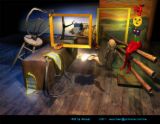
Across the writings of the Frankfurt School there is a consistent sense that art has partially 'held out' against the advance of disenchantment and rationalization in modernity which has subjected the rest of our world to the utilitarian, dominating logic of instrumental reason.
In so far as it is autonomous, art is a refuge where something is preserved from the spirit of Enlightenment.
[as Kant's vision of it: "the idea of a free, human social life in which men organize themselves ...in the conscious solidarity of the whole."]
"Even in the most sublimated work of art Adorno insists, "there is a hidden 'it should be otherwise'". The truth that art speaks is the untruth of the status quo, it is the antithesis of that which is the case.'"
Art breaks the spell of actuality and enables us to see that things could be different. This longing for a better world, 'une promesse du bonheur,' is linked by Horkheimer with the residually theological in the aesthetic. Adorno agrees that works of art point to a practice from which they abstain:"the creation of a just life. In this they also resemble the purposelessness of childish play."
It is important however to note here that, despite this favourable account of the political power of the aesthetic, its utopian elements are, particularly for Adorno, only ever negative. There can be no positive account of this utopia, or how it should be attained, let alone the recognition of anything as the positive advent of these utopian realities.
The question then becomes, can the pursuit of such ends be justified if the purposes of such ends are primarily negative. Is art then a failure? Have we lost the productive and creative abilities of those citizens who lives incorporate an artistic vision or milieu?

No comments:
Post a Comment